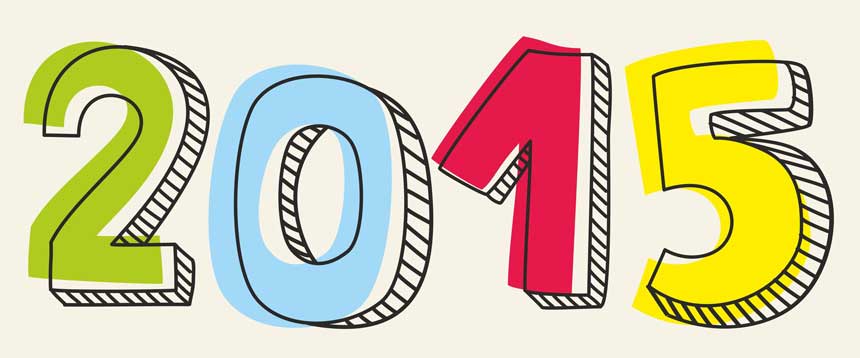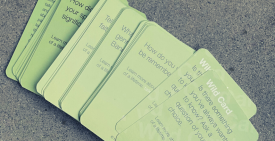I just finished writing a condolence note that I should have sent off some three months ago. I should know better; I do know better. After all, I am the co-founder of a site about navigating life after loss. And I understand first hand how much cards and letters can mean to those who are grieving.
In my closet, there’s an alphabetized accordion folder (labeled “Correspondences 2004) full of the notes I received in the days and weeks after my father and stepmother were killed. I kept every last one. After we moved to a new neighborhood last year, I nearly had a panic attack when — for a few hours — I thought the folder might have gotten lost in the transition.
Still, today I sat searching for the right words to comfort a friend who suffered an unimaginable loss, and kicking myself for not searching for those words so much sooner. Because knowing better and doing better are two different things. In 2015, I resolve to do better. To that end, here are 5 New Year’s resolutions. And since “Help Others” is among America’s most popular resolutions, these are also suggestions for anyone who wants to do more to help the grieving people in their lives.
1). Set Up Alerts on a Google Calendar
Don’t rely on good intentions and a good memory to remember to check in with a grieving friend on difficult days. Instead set online calendar alerts — the deceased’s birthday, “deathiversary,” or the week before Thanksgiving, say — as reminders to call, write or make plans with the friend.
2). Ask for (and Offer) Specifics
One phrase a grieving person is almost certain to hear again and again: “Let me know if you need anything.” But few take advantage of that offer. Because it’s not always clear if it’s earnest or boilerplate. Because loss can be so disorienting that the person who just experienced it might not know what they need. So don’t let yourself off the hook (and place the onus on the grief-stricken) with some vague offer to help. Ask them what their favorite takeout restaurant is, and buy them a gift certificate. Say you’re headed to the supermarket later in the week and would like to pick up some groceries for them. Offer to connect them with others who have experienced a similar loss and, of course, follow through.
3). Make a Memorial Donation, Then Make Another
After my father and stepmother were killed, many people sent memorial donations (and planted trees in Israel) in their honor. But a few close friends donated to a scholarship fund set up in their name or to a non-profit that supports family members of homicide victims to acknowledge their birthday, even years on, or to mark a special occasion in my life. When I gave birth last year, a dear friend gave to the scholarship fund (which, let’s be honest, was so much more meaningful than another bamboo burp cloth).
4). Remember Social Media Condolences Are *Only* a Starting Point
In the age of social sharing, it’s easy to let just about everyone in your life know about a loss in the family. It’s just as easy to post a few quick words of sympathy on someone’s Facebook page. And I know from experience that each comment and “like” can provide a modicum of comfort on “deathiversaries.” For me, what proved even more comforting was when a friend, reminded on Facebook about the difficulty of the day, came through with a phone call or an email in which they shared an anecdote about my dad or an invitation to come over and watch reality TV over Chinese takeout. The bottom line: Let social media be the impetus for more meaningful action.
The best advice on social media condolences come from our resident sage Meg Tansey, who writes our advice column. She put it this way: “My first rule of grief is that the worst thing you can do is nothing. So at the risk of horrifying both grandmothers and etiquette experts everywhere, I think you are correct that if someone posts about a loss in their life on Facebook, you are not in the wrong to respond on Facebook. There are two main reasons for this, one: I generally feel that you should follow the grieving person’s lead as much as possible (i.e. talk about the person if they want to talk about the person/don’t if they don’t). Two is that I think a medium like Facebook can be a great way to provide someone with a much-needed real-time jolt of sympathy and community. And community support, both in real life and increasingly online, is an important part of the mourning process. That being said, is a Facebook comment sufficient for a friend mourning his mother? Of course not. A more thoughtful follow-up, whether it’s a note or a call or an e-mail is in order.” Read what else Meg had to say on the topic here.
5). Hand-Write That Letter and Send It (Sooner, Not Later)
We put off condolence notes for many reasons, but often it’s because we can’t seem to find the right words. But here’s the thing: There’s nothing anyone can say that will make a grieving person’s hurt go away. So let go of finding the perfect words, and just be honest. Remind them that they are loved, share a cherished memory of the deceased — just don’t put it off. Because these things are better late than never, but they are also better sooner than later. And, as “How To Say It” author Rosalie Maggio said in her Modern Loss sympathy note primer, keep your focus on the bereaved. You can apologize for the delay in getting the card out, but don’t make excuses. They don’t need to know that your kid has had recurrent pink eye or that your sister is in the middle of a divorce; it’s not relevant and it’s not about you.
Gabrielle Birkner is co-founder of Modern Loss.









